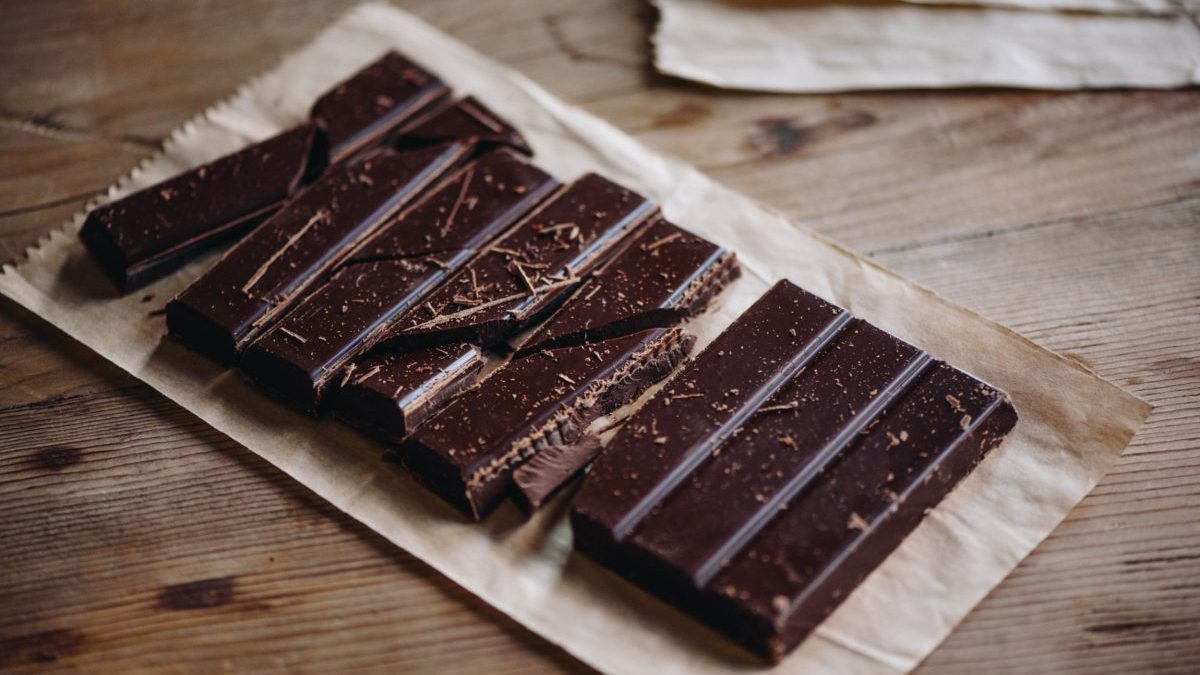Dark chocolate is one of those unusual foods that is as nutritious as it is delicious. It’s not just a healthier alternative to its sweeter milk counterparts, but is beneficial in its own right. As dietitian Nichola Ludlam-Raine puts it: “I don’t just include it in my diet… I call it a ‘health food’!”
Here are five reasons to feel good about eating dark chocolate (anything 70 per cent cocoa or higher) regularly.
It’s good for your gut – with more fibre than bread
Cocoa – the key ingredient in chocolate – is a nutritional powerhouse. As dark chocolate will have an inherently higher cocoa content, that means you are getting more of that good stuff per bite.
“Dark chocolate contains fibre (around 11g per 100g in 70 per cent chocolate) which supports gut health and contributes to fullness,” Nichola says. It also contains several key minerals like magnesium, good for relaxation and sleep, plant-based iron and copper for energy, and zinc for immune health.
The epidemiologist and gut health expert Tim Spector has said polyphenols in dark chocolate “are like rocket fuel for your gut microbes” and that the fibre in one portion (approximately three squares) is double that of a slice of wholegrain bread. He eats it regularly.
Your heart (and blood pressure) will thank you
Cocoa powder is rich in plant-based compounds called flavonoids, which are very beneficial. “They support heart health by improving blood flow and lowering blood pressure,” Nichola says.
One long-term trial, published in 2022, found that cocoa supplements reduced heart-disease-related deaths by 27 per cent. And two reviews, one in 2017 and another in 2018, found that eating chocolate fairly regularly reduced the risk of cardiovascular disease. However, the authors of the latter research added that consuming more than 100 grams per week doesn’t appear to produce benefits.
A meta-analysis found that dark chocolate reduced hypertension better than placebo treatment. The flavonoids stimulate the lining of the arteries, causing the blood vessels to relax.
The antioxidants in cocoa may even help lower levels of the ‘bad’ cholesterol, according to one 2021 review, and therefore help protect against heart disease.
It can help keep your weight in check
Research published this week found that dark chocolate acts on hormones that control feelings of hunger and fullness.
The scientists at the University of Eastern Piedmont in Italy have invented a cocoa-rich biscuit including an extra ingredient that mimics weight loss jabs like Ozempic and Wegovy.
Previously, a Harvard study suggested eating five portions (about 25 grams each) could cut the risk of Type 2 diabetes by a fifth, while other research has found dark chocolate useful for reducing obesity and aiding in weight loss.
Nichola also points out that dark chocolate, thanks to its higher cocoa content, tends to be lower in sugars and fat than other chocolate products. This lower sugar/fat content is why it is much harder to finish a whole bar of dark chocolate, but a bar of milk chocolate can easily disappear. It also means dark chocolate is less likely to need emulsifiers to bind ingredients together.
“Unlike ultra-processed chocolate bars packed with emulsifiers and excessive sugar, which can drive over-consumption, dark chocolate can satisfy sweet cravings,” she says. “A little goes a long way, helping to curb the urge for sugary, processed treats.”
It’s anti-inflammatory and helps with longevity
Unsurprisingly, flavonoids, which are antioxidants, can have great anti-inflammatory effects on the body. They can protect from free radicals that would otherwise increase the risk of everything from diabetes to cancer. But another compound in dark chocolate, called theobromine, is thought to enhance the absorption of those polyphenols and therefore increase the anti-inflammatory effects.
One recent study by King’s College London suggests that the compound is linked with extending lifespan and slowing ageing changes otherwise associated with diet, lifestyle, and environmental factors.
It’s a certified brain (and mood) booster
Chocolate with a high level of flavonols has been shown to improve blood flow to the brain in young adults in some studies, as well as maintain brain health and potentially reduce the progression of dementia. This is not just attributed to the antioxidants but also theobromine and caffeine found in chocolate, which can act as mild stimulants.
Then there’s the mood boosting effects. “Dark chocolate may support mood and relaxation”, Nichola says, “as it contains small amounts of serotonin precursors which may promote feelings of wellbeing.” A study from UCL found that specifically eating dark chocolate may positively affect mood and relieve depression symptoms. Which is to say nothing of the pleasurable benefits of eating chocolate in and of itself.
The bars to eat, and which to avoid
Experts recommend that the higher the cocoa content, the better, but 70 per cent is a good starting point – Lindt, Green & Blacks and Montezuma all hit this limit.
These bars also do not contain emulsifiers, meaning that they are not considered ultra-processed foods; however, evidence suggesting all emulsifiers must be avoided is mixed, and small amounts are unlikely to impact human health. If you are concerned, brands such as Cocoa Loco do not contain emulsifiers, E-numbers or other additives.
“Portion-wise, a few squares (around 20–30g) is a great place to start,” Nichola says. “Satisfying without overdoing it. I recommend the little 70 per cent dark chocolate bars from Lidl – 5 x 25g bars in a pack!”
You can also get the benefits and bypass the chocolate entirely by adding cocoa powder to your porridge or mixing it with nut butter and dates for a whole food-based sweet treat.
